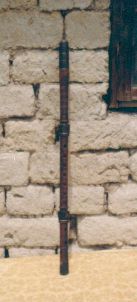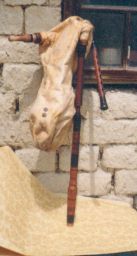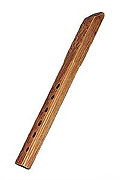|
|
Духови инструменти
|
 |
Kaval
The kaval is one of the
most diffused musical folk instruments used very
much from the Bulgarians long time ago still now.
It's used in whole Bulgaria but specially in
Thrace and Dobrudja. The technical construction of
the kaval from all of the kinds is the same. They
differ only in the length of the pipe. There are
kavals with lengths of 50, 70, 75 and 80 cm. In
consequence with it the kavals are with different
kind of highs (different tunes). The kaval's
volume of the tone is concerned with the
tune.
|
 |
Gaida
The gaida is an instrument
which is used from all European nations. It's
composed from the following parts: gaidunitsa,
ruchilo, duhalo, glavini and meh. Gaidunitsa is
the most important part of the gaida and is a kind
a pipe with eight holes for the fingers, seven of
them which are on the front side and the eight
hole is on the back side of the pipe. The tone
possibilities of the gaida are poorer then these
of the caval. The players are used in differing
two main kind. Low (caba) and high (dzhura) - the
low type of gaida is diffused in the mountain
regions. In Bulgaria is popular so called
Rhodopian (mountain) gaida, which is used from the
accompaniment of the fine lyrical Rhodopian
gaidars. The most used gaida is with the main tone
"sol" (dzhura). It's with a loud tone
possibilities in comparison to the other kind of
gaida.
|
Svirka (tsarafa, svorche, a little
kaval)
The shepherd's gaida called tsafara
too, is a one-tubed, wooden, cylindrical tube long
from 25 to 30 cm with six holes for fingers on it.
The technical and the tone possibilities of the
shepherd's gaida are limited. The nozzle
(naustnik) and the way of blowing are the same
with the way of playing on a kaval. |
 |
Duduk (diudiuk)
The duduk's
nozzle has a bill form. It's different from the
little kaval and the tsafara with its construction
and way of reproducing the sound. It's used mostly
in west Bulgaria (rarely in other regions) usually
in two extents - big and small duduk. It's made
from ash-tree, cornet tree, sycamore or
cherrytree.
 |
Dvoyanka
It is a double pipe
(gaida), which has a form of a rectangular prism
or which is more rarely is composed form two
parallel cylindrical tubes. It has a length from
30 to 40 cm. All of the two tubes begin with a
bill formed nozzle in which the tone is produced
with an ordinary blowing. When playing on a duduk
the two tubes are temporary blown. |
|
| |
| |
|
|
|